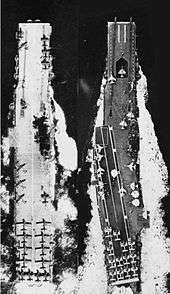SCB-125
_underway_during_sea_trials_on_15_September_1955.jpg)

SCB-125 was the United States Navy designation for a series of upgrades to the Essex class of aircraft carriers conducted between 1954 and 1959. These upgrades included the addition of an angled flight deck and other enhancements aimed at improving flight operations and seakeeping.
Principal alterations
The SCB-125 modifications included
- Angled flight deck
- Enclosed hurricane bow
- Mirror landing system
- Mark 7 arresting gear
- Primary Flight Control moved to aft end of island
- Air conditioning
- No 1 (forward) elevator lengthened (SCB-27C ships only)
- No 3 (aft) elevator moved from centerline to starboard deck edge (on SCB-27A ships; had been part of SCB-27C refits)
Program history
The SCB-125 upgrade program was first applied to the final three Essex-class carriers to undergo the SCB-27C modernization while they were still in the midst of their original refit. Ultimately every SCB-27 ship would undergo the SCB-125 modification with the exception of USS Lake Champlain (CV-39).
Despite the drastic alteration of the carriers' appearance, the SCB-125 refit involved relatively little modification of the ships' existing structure compared to SCB-27, and took around six to nine months as against the approximately two years of the earlier program. The original SCB-27A vessels, which were fitted with a pair of H 8 hydraulic catapults, were not upgraded with the C 11 steam catapults fitted to their SCB-27C sister ships due to machinery space limitations. The SBC-27As also did not receive the enlarged No. 1 (forward) elevator installed in the 27C ships as part of SBC-125.
The first three 27C ships (Hancock, Intrepid and Ticonderoga) had had their No 3 elevators moved from the centerline to the starboard deck edge, in a position relatively far aft. The next three (Shangri-La, Lexington and Bon Homme Richard), which underwent 27C and 125 concurrently, had the elevator relocated to a deck-edge position farther forward, and this location was used for the 27A ships as they in turn underwent SCB-125.
USS Oriskany (CV-34), the prototype for the SCB-27 conversion, was the final Essex to undergo SCB-125 conversion and as such, received further enhancements. As a result of the addition of aluminum flight-deck cladding, Mk 7-1 arresting gear and more-powerful C 11-1 steam catapults to the standard SCB-125 modifications, Oriskany alone was referred to as a SCB-125A vessel.[1] These changes also made Oriskany the only SCB-27A vessel to receive steam catapults.
Modified vessels
Source:www.history.navy.mil [2]
| Program | Shipyard | Work Began | Recommissioned | |
| USS Shangri-La (CVA-38) | SCB-27C/125 | Puget Sound | Oct 1952 | Jan 1955 |
| USS Lexington (CV-16)1 | SCB-27C/125 | Puget Sound | Sep 1953 | Aug 1955 |
| USS Bon Homme Richard (CVA-31) | SCB-27C/125 | Hunters Point | May 1953 | Sep 1955 |
| USS Bennington (CVA-20) | SCB-125 | New York | Jun 1954 | Apr 1955 |
| USS Yorktown (CVA-10) | SCB-125 | Puget Sound | Mar 1955 | Oct 1955 |
| USS Wasp (CVA-18) | SCB-125 | Hunters Point | Mar 1955 | Dec 1955 |
| USS Randolph (CVA-15) | SCB-125 | Norfolk | Aug 1955 | Feb 1956 |
| USS Essex (CVA-9) | SCB-125 | Puget Sound | Aug 1955 | Jan 1956 |
| USS Hornet (CVA-12) | SCB-125 | Puget Sound | Jan 1956 | Aug 1956 |
| USS Hancock (CVA-19) | SCB-125 | Hunters Point | Apr 1956 | Nov 1956 |
| USS Kearsarge (CVA-33) | SCB-125 | Puget Sound | Jul 1956 | Jan 1957 |
| USS Ticonderoga (CVA-14) | SCB-125 | Norfolk | Aug 1956 | Apr 1957 |
| USS Intrepid (CVA-11) | SCB-125 | New York | Sep 1956 | May 1957 |
| USS Oriskany (CVA-34) | SCB-125A | Hunters Point | Jan 1957 | May 1959 |
1 Lexington was redesignated CVA upon completion of SCB-27C/125
References
- ↑ Friedman, Norman (1983). U.S. Aircraft Carriers: An Illustrated Design History. Annapolis: Naval Institute. ISBN 0-87021-739-9.
- ↑ "U.S. Navy Ship Types - SCB-125 modernization of Essex/Ticonderoga class aircraft carriers". U.S. Navy Historical Center. 2001-10-09. Retrieved 2006-12-05.